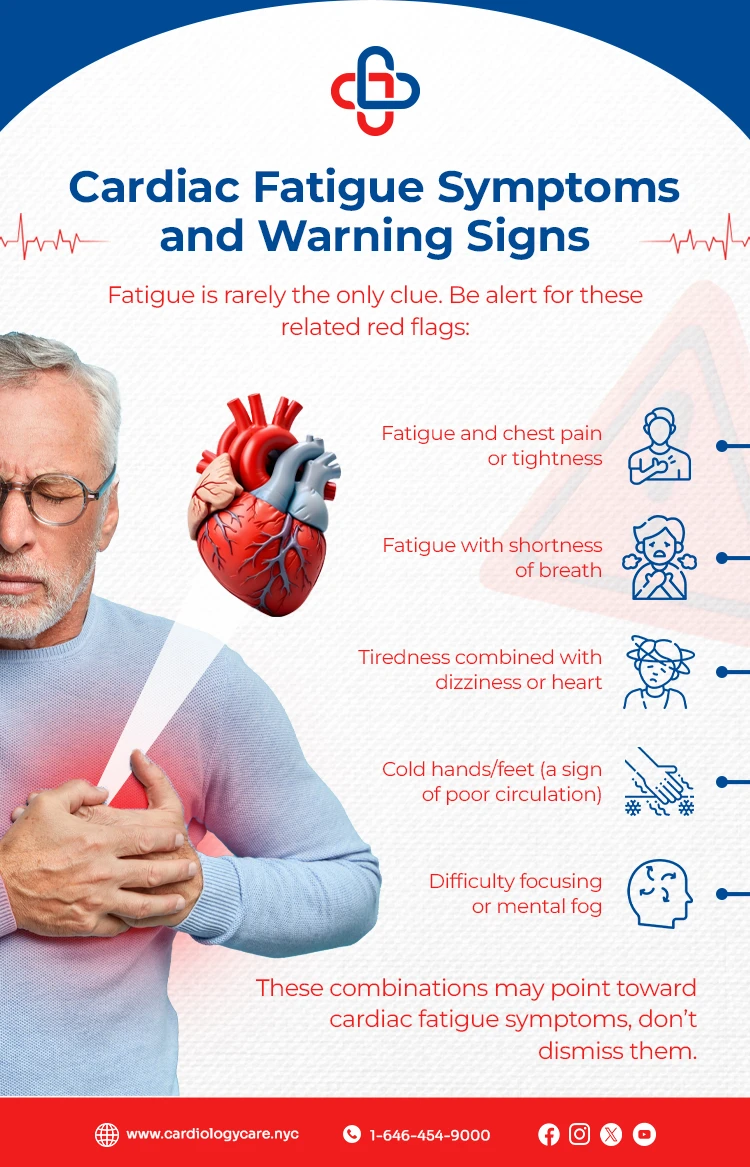Always tired, even after rest? It could be more than stress, it might be your heart signaling trouble.
Fatigue is often an early and overlooked symptom of heart disease. At Cardiology Care NYC, we regularly help patients who thought their tiredness was just part of life, only to find an underlying cardiac issue. This article explains how heart problems cause fatigue, what to watch for, and when to seek expert care.
Table of contents
Connection Between Fatigue and Heart Disease
Your heart is responsible for circulating oxygen-rich blood to your muscles and brain. When the heart isn’t pumping efficiently, due to heart failure, coronary artery disease, or other conditions, your body is essentially running on low battery.
This drop in oxygen and nutrient delivery causes low energy and fatigue, even without heavy exertion. Whether it’s fatigue after a heart attack or tiredness from slow-progressing heart failure, it’s your body signaling that something deeper may be going on.
What Does Heart-Related Fatigue Feel Like?
Heart-related fatigue often feels different from general tiredness. You might notice:
- Extreme fatigue after minimal activity (like walking one block or climbing stairs)
- Exhaustion that doesn’t improve with rest
- A nagging sense of mental and physical drain
- A sensation like my heart is tired or I’m running on empty
You may also experience:
- Shortness of breath
- Lightheadedness or dizziness
- Mild chest discomfort
- Mental fog
Common Heart Conditions That Cause Fatigue
Several heart issues can make you feel constantly drained. Here’s how they relate to fatigue:
- Heart Failure: The heart can’t pump enough blood to meet the body’s needs, leading to fluid buildup and poor energy delivery.
- Arrhythmias: Irregular heart rhythms (like AFib) can reduce blood flow, causing low energy and fatigue.
- Coronary Artery Disease (CAD): Narrowed arteries limit oxygen to the heart muscle, which can cause chronic tiredness.
- Post-Heart Attack Fatigue: Recovery often includes inflammation, heart muscle damage, and emotional stress; fatigue is common.
Cardiac Fatigue Symptoms and Warning Signs
Fatigue is rarely the only clue. Be alert for these related red flags:
- Fatigue and chest pain or tightness
- Fatigue with shortness of breath
- Tiredness combined with dizziness or heart palpitations
- Cold hands/feet (a sign of poor circulation)
- Difficulty focusing or mental fog
These combinations may point toward cardiac fatigue symptoms, don’t dismiss them.
Why Does Heart Failure Cause Fatigue?
It’s one of the most frequently asked questions, Here’s the breakdown:
- In heart failure, fluid builds up in the lungs and tissues, making breathing difficult and movement tiring.
- The heart’s reduced pumping ability means less blood and oxygen are delivered to muscles and the brain.
- The result? You feel physically and mentally exhausted, even after doing very little.
This is often called cardiovascular fatigue, and it’s one of the most common symptoms in chronic heart failure.
Can Fatigue Be the Only Sign of a Heart Problem?
Yes, and it happens more often than you might think.
Especially in:
- Women, who often have subtle heart symptoms
- Older adults, who may not experience classic chest pain
- People with diabetes or high blood pressure, where symptoms develop slowly
Many patients say things like, I just felt off, or, I thought I was just out of shape. Fatigue without obvious chest pain still warrants a full evaluation; your body is speaking. We’re here to listen.
When to See a Doctor About Fatigue
At Cardiology Care NYC, we offer a full range of diagnostic tools and evaluations to uncover the root cause of persistent fatigue. Whether your symptoms are related to heart rhythm, blood flow, or cardiac function, our team uses targeted testing to get you answers fast.
Highly Relevant Services for Evaluating Cardiac Fatigue:
- Cardiology Consultation: One-on-one evaluations to explore fatigue, shortness of breath, or other heart symptoms.
- Heart Health Screening: A proactive look at your cardiovascular risk factors.
- Cardiac Screening: Advanced tests to detect early or hidden heart conditions.
- Echocardiogram Test: Visualize heart function and detect structural issues.
- Holter Monitor: Monitor irregular heart rhythms over 24–48 hours.
- Electrocardiogram (ECG): Detects arrhythmias or past heart injury.
- Stress Test: Identify how your heart responds under physical demand.
- Nuclear Cardiology: Assess blood flow and detect coronary artery blockages.
Moderately Relevant Services:
- Vascular Ultrasound: Evaluate circulation in the limbs.
- Blood Pressure Screening: Check for high or low blood pressure that may contribute to fatigue.
- Stroke Screening: Rule out neurological causes of fatigue.
If your fatigue is:
- Lasting more than 2 weeks
- Accompanied by shortness of breath, palpitations, chest discomfort, or swelling
- Affecting your ability to work, walk, or enjoy life
- Occurring after a recent heart event (like a stent, bypass, or heart attack)
It’s time for a cardiac evaluation.
At Cardiology Care NYC, we offer in-house tests like echocardiograms, Holter monitoring, vascular ultrasound, and lab panels to uncover the cause and tailor a treatment plan.
Conclusion
Persistent fatigue may be your heart signaling trouble. If you’re feeling drained, especially with shortness of breath, brain fog, or a racing heart, it’s time to get checked.
At Cardiology Care NYC, we treat fatigue as a vital sign of heart health. With locations in Manhattan and Forest Hills, we offer quick access to expert evaluation and testing.
Book your appointment today and take a simple step toward feeling better.
Frequently Asked Questions
Can weather changes affect fatigue in people with heart conditions?
Yes. Sudden temperature drops or high humidity can strain the cardiovascular system, especially in individuals with heart failure, often making fatigue and breathlessness worse.
Does caffeine help or hurt heart-related fatigue?
While caffeine may offer a temporary energy boost, it can also increase heart rate and blood pressure. In people with arrhythmias or certain heart conditions, it might worsen symptoms like palpitations or tiredness.
How does poor sleep from sleep apnea impact cardiac fatigue?
Sleep apnea deprives your body of oxygen during rest, which forces the heart to work harder. Over time, this can lead to high blood pressure, heart disease, and chronic fatigue, even if you think you slept all night.
Is heart-related fatigue common in younger adults?
It’s less common but possible, especially in those with undiagnosed congenital heart issues, early-stage cardiomyopathy, or lifestyle risks like smoking, stimulant use, or untreated hypertension.
Can emotional stress mimic or trigger cardiac fatigue?
Absolutely. Chronic stress activates hormones like cortisol and adrenaline, which increase heart workload. This can lead to functional fatigue or even unmask early signs of heart dysfunction in high-risk individuals.
Disclaimer
This blog is for informational & educational purposes only and does not intend to substitute any professional medical advice or consultation. For any health-related concerns, please consult with your physician, or call 911.

